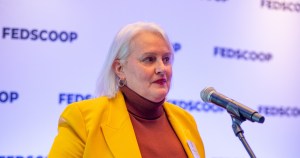Techies: In 5 years, chatbots could become a govt customer service norm

Booz Allen Hamilton and Conversable are teaming up to tackle what could be government’s next big move to improve customer service — chatbots.
Booz Allen announced Monday that the two companies have a “joint strategic focus to advance, test and deliver world-class automated interactive messaging, tools, services and experiences that fundamentally enhance and transform customer care in all channels.”
“The federal government is uniquely positioned and motivated to seize the opportunity and deliver on the promise for self-service,” Michael Isman, vice president in Booz Allen’s Strategic Innovation Group, told FedScoop.
The companies plan to leverage advances in artificial intelligence, machine learning and natural language processing to advance the capabilities of chatbots — automated software programs developed to converse with people, usually via messaging.
“The idea is — we believe that the gains [in artificial intelligence, machine learning, automated next-gen analytics, crowdsourcing] can be most readily realized through the deployment of chatbots,” Isman said, “to improve client, customer and stakeholder access, listening, responsiveness, [and] service delivery.”
Booz Allen’s claims that in the next five years, messaging will replace call centers and become the “preferred path” for customer service.
“It actually… makes the experience more tailored to the individual and, you know, avoids the sort of endless response loops and those types of things that go on in customer service channels today,” Isman said.
Likewise, in the next half-decade, Isman said, Booz Allen expects these kinds of changes to become the norm for government as well.
“What we’re trying to do is push our federal clients to actually move into these areas because not only does it simplify the interaction with citizens, it’s actually a cost-reduction opportunity around these programs,” Isman said.
He added that it would help agencies spend more of their budgets on mission enhancements and less on operating costs.
“I think our job is to try to move this with our clients as quickly as possible,” Isman said. “We’re already seeing the commercial market adopt these in meaningful ways, and from my experience, you know, the government usually does adopt commercial best practices.”
This is a relatively new concept for federal agencies, he noted, but the company is seeing its clients talk about leveraging chatbots in a broad sense.
“I think that we’ll start seeing agencies leverage these things in a meaningful way,” Isman said. “We are seeing them explore in this area…. Especially as it relates to the automated customer care.”
The General Services Administration’s 18F team uses a Slack-based chatbot internally to help onboard new team members.
The White House has also said that the U.S. needs to capitalize on automation fueled by innovation in artificial intelligence and machine learning.
[Read more: White House: U.S. wants to be at the forefront of automation policy]
Conversable is a software-as-a-service platform for intelligent messaging experiences. Conversable worked with restaurant chain Wingstop, for example, to create a chatbot that uses messaging on Facebook and Twitter to let customers order food or ask questions.
“Conversable is a pioneer in this area, and we are excited to explore this strategic focus area with them,” Isman said.
Messaging and social media have changed how people communicate, Andrew Busey, co-founder and chief product officer of Conversable, said in the announcement.
“Businesses and government agencies have started to respond to these changes in how people communicate by embracing social media,” Busey said. “Messaging is the next wave and it will represent a much bigger change. Conversable helps large enterprises interact with their customers on any messaging platform to meet that customer demand.”






